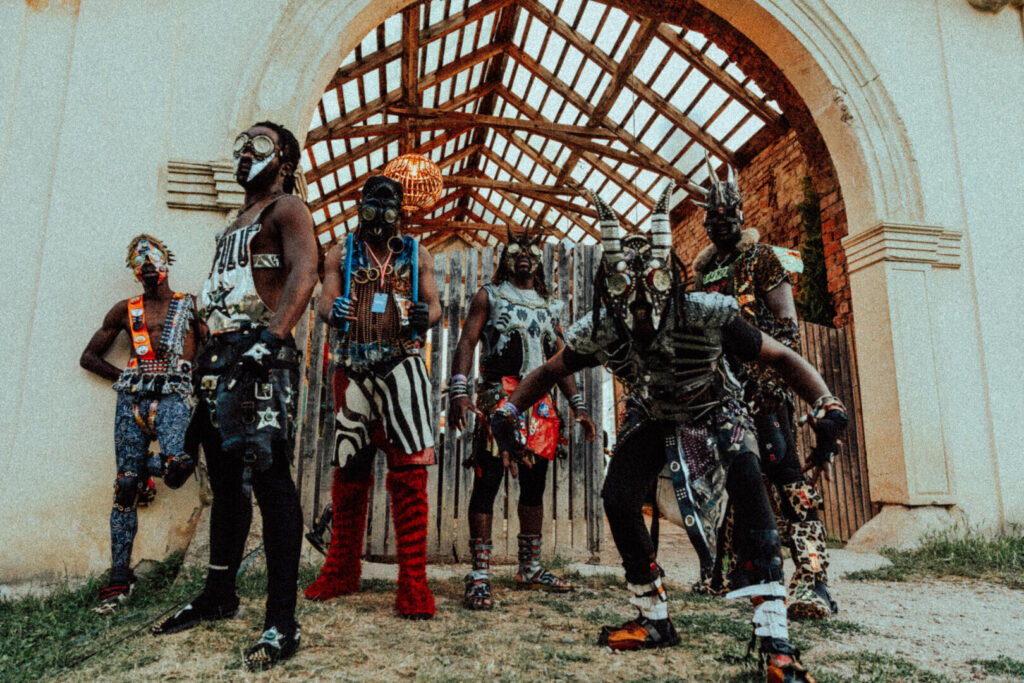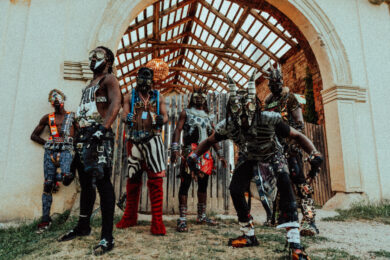For years, the Democratic Republic Of The Congo’s capital Kinshasa has struggled with a plastic waste crisis. A recent article suggested that of the 10,000 tonnes of waste produced in the city each day, less than 20 per cent is collected by urban authorities – leaving bottles, jerrycans and other detritus to pile up. The problem extends well beyond Kinshasa: in recent months, videos have emerged of plastic clogging the enormous Ruzizi hydroelectric dam on the other side of the country, causing power cuts in several cities.
As you’d expect of a city with Kinshasa’s rich musical history, not least its association with rumba and soukous – guitar-driven styles of dance music which emerged in the 20th century and gradually found global audiences – local artists have incorporated this reality into striking, poignant art. Performance art group Ndaku Ya La Vie Est Belle have turned soda cans and dolls heads into costumes. Techno punk outfit KOKOKO! have employed instruments hand-built from powdered milk cans and plastic barrels. One of the most intriguing of all these projects, set to perform at this year’s Tremor Festival, is Fulu Miziki: roughly translating from Lingala as “music from the garbage.”
Founded in 2003 by Pisko Crane, Fulu Miziki play instruments hand-built from discarded materials, including PVC piping and oil cans. On record, their intense, irresistibly fun take on soukous marries the synthetic bounce of Matmos’ Plastic Anniversary with the kind of industrial, futuristic sheen typical of releases on Uganda’s Nyege Nyege Tapes. It was on this label, after 19 years building their name as a live act, that they finally released their 2022 debut album N’Djila Wa Mudujimu. The lineup has shifted over the decades, with two members leaving in 2016 to form KOKOKO! At the same time, local performance artist Lady Aicha joined for a period, singing lead vocals and helping design the group’s striking masked costumes.
The current incarnation of the group, featuring neither Crane nor Lady Aicha, released their latest EP Mokano last year on Moshi Moshi. A sunnier, more skeletal record than either N’Djila Wa Mudujimu or their 2022 EP Ngbaka, it explores themes of work, the need to heal divisions between people, and the ecological mission gestured at in their upcycled instruments. As they chant in EP highlight ‘Bopeto’ (Lingala for ‘hygiene’), “let’s remove rubbish, for better life.”
Ahead of their performance at Tremor, the band answered a few questions from tQ over email about their music, and what audiences might be able to expect from their unique, ecstatic live shows.
Your music as Fulu Miziki repurposes found, discarded objects and materials as musical instruments. How did you begin using garbage in your music, and what inspired you to do so?
Creativity has no limit – when you’re curious, you’re always end up knowing something great. It’s always good to be curious. We search for sounds, because what exists does not satisfy us – we want something true to us.
Fulu Miziki’s origins stretch back to Pisko Crane’s work at the start of the 2000s, and the past 25 years have seen questions about waste and environmentalism – as well as global understandings of these issues – become more urgent and widespread. Could you explain how the project has developed over the years, and how you think the significance of your work has changed?
At this stage, the journey has been great. We have evolved – touring is everything. There’s a huge difference between creating music at home and playing it to an international audience.
I’d love to hear how you source and upcycle these materials. How do you choose what objects you might be able to use in your music, and does touring mean finding these objects during your travels or bringing them from home?
There’s no plan made in advance at all – it’s always once you find something that speaks to you, when you know how to fit it in the right place. Everything has a purpose.
Your live shows also employ masked costumes – how would you explain the relationship between your music and the visual side of things?
Masks are part of our identity. They have been used for ages in our cultures. We love making them – they match with our soul.
You aren’t the only recent project hailing from Kinshasa to upcycle found-objects into art – the Ndaku Ya La Vie Est Belle collective have turned items including doll heads, plastic bottles and tin cans into costumes. How would you describe the music and visual arts scenes in Kinshasa, and what influence have they had on your own work?
When you talk about music, you talk about congo – beats are in our hearts. There’s so much in congo that hasn’t been seen by the world, and we can’t wait to see more and more of us coming to the world.
You’ve worked with Moshi Moshi here in the UK over the past few years, including on your most recent EP Mokano. How would you explain the relationship between your work as a live band and a studio project?
The EP has really been great. We have amazing tracks on that EP, which we recommend everyone to listen to it. The studio is where we have to come up with a very different energy, but it’s the same spirit all over.
Releasing your music as a studio project has the effect, for Lingala speakers certainly, of placing increased focus on the lyrics. Could you talk me through the messages behind your latest EP Mokano?
The message is about love, work, youth.
You’ll be appearing at Tremor Festival – how would you describe your live shows to anyone who hasn’t seen you before, and what would you like to imagine people taking away from your set?
Please have your dancing shoes on – things are about to get messy. Do hydrate as well.
Tremor Festival takes place in São Miguel, Azores next week, from 8 to 12 April. Fulu Miziki will perform as part of a lineup that also features Clarissa Connelly, Comfort, Kabeaushé, Six Organs Of Admittance / Norberto Lobo and many more. For full info, and limited remaining tickets, click here.



